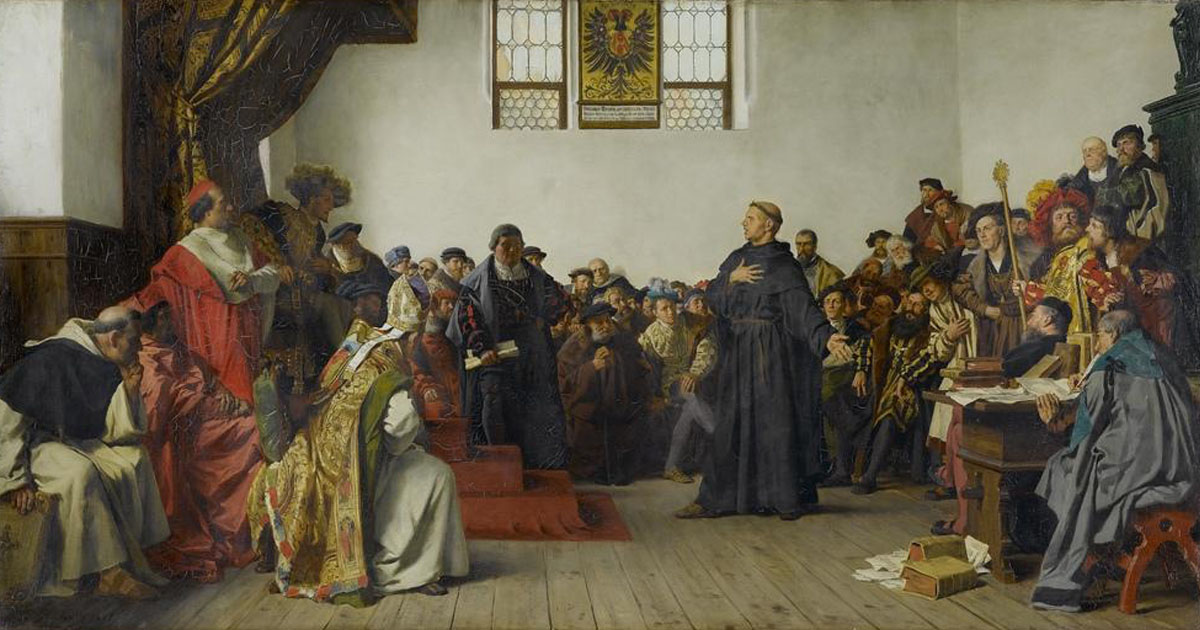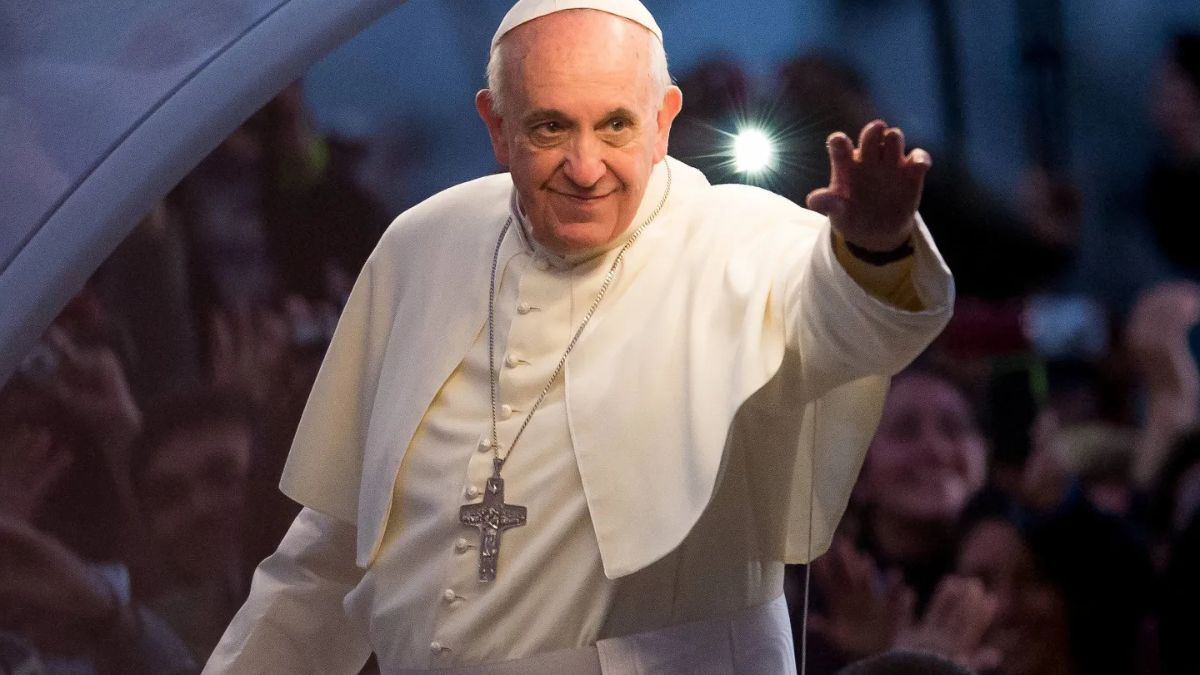


The watching world is expecting Christianity to conform to changing times, but our loyalty to God’s Word and His creational truth demands that sometimes we have to take a stand and say, “No.”
April 18th marks the anniversary of one of the most significant moments in Western history, even if that event is seldom recalled except by historians and theologians. You could even make a good argument that on this day, 497 years ago, the world turned a corner and a new age began. Both as a symbol and as a fact, the events in the unlikely-named town of Worms created the Modern and Postmodern world.
The Diet of Worms (pronounced “Verms”) aimed to deal with a crisis which threatened to, and in fact did, break the peace of Europe and Western Christianity. On that day one individual stood before all the powers-that-be and declared that they were all wrong. On that day our world was born, a world defined by individualism’s vices and virtues. A world which, at its best, insists that liberty of conscience is a core value and treasures the lone voice of dissent, and, at its worst, denies the objectivity of the world and devalues any challenge to another’s subjective impression.
That one moment at Worms exemplifies so much of that day and our own. On April 18, 1521 Martin Luther stood before the Diet, having been called there to change his mind in the face of near-universal opposition. Luther had already been condemned by Pope Leo X, the spiritual head of Western Christianity. Now he faced the most powerful man in the world, Charles V, the Holy Roman Emperor. Luther had the audacity to say that Charles V was wrong and he was right. He looked at the assembled political and religious leaders of his world and said, “No.”
Where the pressure of human society, then as now, puts so much weight on the consensus of agreement, Luther insisted on what he believed to be true. He was willing to die for his beliefs, and he would not change unless he could be convinced by Scripture or simple reason. Echoing the words attributed to Athanasius so many centuries before, Luther was against the world.
Now, historical trends flow from many currents, but there’s something about this moment. Here was the archetype of the bold individual standing for truth against all authorities, decades before the likes of Galileo were even born. Here was the standard that the truth is more important than popularity, unity, or even safety. From this spark came the great explosion of protests against political and religious powers. The medieval dream of Pope and Emperor as sun and moon over Christendom was dead. In its place arose an unstable world where nothing was sacred and anything was up for grabs.
Within the decade the German-speaking world had Lutheran, Anabaptist, and Reformed denominations. Within thirty years the French-speaking world was fractured into Calvinist and Catholic factions, and the British Isles were seesawing between Rome and Geneva. By the end of the century, this second great schism of the Christian world was recognized as permanent. Western civilization was shattered, and the age of religious wars that had begun in Luther’s day would not come to an end until for over a hundred years.
Yet this story of division was not the only one to come out of that April day so long ago. The tyranny of the “divine right” of kings was still in the future, but the seeds of its destruction were already planted at Worms and would come to fruition at Naseby, Yorktown, and the Bastille. The quest for political liberty had its antecedent in that moment of defiance by Luther. In the following decades Puritans, Huguenots, Jansenists, and Dutch rebels would lay the foundation for liberty of conscience a century before Voltaire or Jefferson.
The human individual with inalienable rights would come to the forefront of socio-political discussions as it broke the ancient division of life into sacred and secular spheres. Suddenly, butchers, bakers, and candlestick makers were possessed of as much dignity as any prince or priest. Extra-biblical restraints on financial activities were removed, letting loose rivers of money and allowing for new means of economic activity. The elevation of commoners in art began with the Renaissance in Italy and continued among the Dutch of the Reformation. The idea that consensus and custom were not the same as the truth greased the wheels of the Scientific Revolution and set the stage for the technological advancements of the Industrial Revolution.
This power of the individual against all human authority had its great positive effects, but even staunch Protestants like me have to admit that it had its share of negative implications, too. The philosophical crisis sparked by the Reformation and the wars which followed led to the great skepticism and overconfidence of the Enlightenment. Rather than standing against the world on the basis of Scripture and simple reason, now individuals stood against others and the universe itself on the basis of their flawed perceptions and limited perspectives.
In our day this arrogant principle has devolved into the Magisterium of the transient moment, where all values and truth-claims shift as quickly the latest clothing fad, where the Protestant doctrine of the priesthood of all believers has mutated into the demand for all individuals to be able to create God, the universe, and our very natures into our own self-image.
Where Luther tried to correct a set of errors, we have created our own constellations of problems in the opposite direction. He wanted Scripture and simple reason, and we want to create our own Bible even as we reject reason in favor of our shifting emotional identity. He wanted to face the truth, and we think there is no truth.
It would be easy when seeing such unexpected offspring of Luther’s protest to throw up our hands in despair. Why should we bother to protest falsehood if it just ends up undermining the whole idea of truth? If Luther’s individual stand opened the Pandora’s Box of individualist chaos in our age, wouldn’t it be better if we ignored his example?
This is to miss the basis of Luther’s individualism. Luther’s protest was not like the protest of our period. Where our culture wants to say that there is no truth greater than an individual’s perception, that your truth is not my truth, Luther said that the truth was greater than anyone’s perception, individual or group, church or state. Where we want to say that there is nothing enduring, nothing eternal, but only an ever-evolving, progressive truth, Luther said that the customs of his day, and all days, could not surmount the authority of the Word of God.
We don’t have to agree with all of Luther’s theological principles to be inspired by his courage and the basis of his protest. He stood for the truth. He stood for the idea that there was a truth and that it was not for human institutions to determine what that truth was. In our day, like Luther’s, there is great pressure to conform, to fit in, to accommodate ourselves to the political and cultural powers that be. In our day, unlike Luther’s, the pressure and danger comes from those who say that there is no truth, that human individuals create their own truth.
Our response must be like Luther’s, to take our stand on Scripture and simple reason. When the watching world sits as one and calls falsehood truth, we must, like Luther be willing to stand alone and say, “No.”
Here should we stand.
Image: WikiCommons














